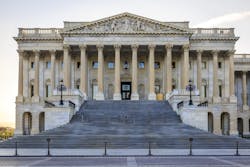US Congress Set to Approve $900 Billion Stimulus Package
by Heather SCOTT
U.S. lawmakers are set to vote Monday on a $900 billion relief package to help millions of families and small businesses struggling amid the pandemic.
As the Covid-19 death count rises amid a massive resurgence of the virus that again threatens the economy, Republican and Democratic legislators finally hammered out the plan late Sunday after months of wrangling and bitter debate over what to include.
The deal will spare millions of jobless workers who were days away from seeing their unemployment benefits expire, and provide a new round of cash payouts.
Small businesses will benefit from more government grants, while the package also includes rental assistance and help to families facing eviction.
"It's a good bipartisan deal," Democratic House Speaker Nancy Pelosi said Monday. "We will do some good with this legislation."
But "as President-elect Joe Biden has said, it's a first step, and we will need to do more. More to get virus assistance to crush the virus. More money to buy vaccines," she said on the House floor.
The House and Senate will have to vote on the bill, but it could go late into the night. Congressional leaders have pledged not to leave Washington until the package is approved.
The world's largest economy is facing the world's largest coronavirus outbreak, and the virus returned with a vengeance in recent months threatening a tentative economic recovery. The death toll has topped 318,000.
Recent data shows retail sales slowed heading into the usually-strong holiday shopping season, while new applications for unemployment benefits have risen for four of the past five weeks after months of declines.
Democratic Senate Minority Leader Chuck Schumer said the aid is not enough to deal with the crisis.
"This bill is a start, but it is not the end of the story. Anyone who thinks this bill is enough hasn't heard the desperation in the voices of Americans," Schumer said on Twitter.
Cash Injection
The massive package is part of a $2.3 trillion "coronabus" bill that includes the omnibus bill to fund the government for the coming year.
The measure will include a new round of pandemic relief payments, and US Treasury Secretary Steven Mnuchin said the $600 checks will go out as early as next week.
That amounts to "$2,400 for a family of four, so much needed relief just in time for the holidays," Mnuchin said Monday on CNBC.
While the direct payments are only half the amount provided by the $2.2 trillion CARES Act that Congress approved in March, Mnuchin said it is a "very fast way of getting money into the economy."
The $600 payments go to Americans earning less than $75,000 a year, and would be reduced for higher incomes, while those who bring home $99,000 or more will not get a check.
The largest provision is the $275 billion in Paycheck Protection Program (PPP) aid for businesses, which are government loans that convert to grants if spent on wages and rent.
The agreement also contains $25 billion in rental assistance, extends an eviction moratorium for one month.
Biden, who will be sworn in January 20, has welcomed the agreement but said much more will be needed to provide "support to struggling families, and investments in jobs and economic recovery," he said in a statement Sunday.
Progressive New York Representative Alexandria Ocasio-Cortez complained Monday that legislators still did not have copies of the more than 5,550-page bill.
"It's not good enough to hear about what's in the bill. Members of Congress need to see & read the bills we are expected to vote on," she tweeted.
Officials told reporters that software glitches delayed printing the massive document.
After months of talk, the deal seemed endangered in the final days by a dispute over a Republican-backed provision to limit the ability of the U.S. Federal Reserve to provide more emergency lending.
But Democrats were able to block that move by Republican Senator Patrick Toomey, although they were not able to insert billions of dollars in aid to state and local governments on the front line of responding to the virus impact.
Copyright Agence France-Presse, 2020
About the Author
Agence France-Presse
Copyright Agence France-Presse, 2002-2025. AFP text, photos, graphics and logos shall not be reproduced, published, broadcast, rewritten for broadcast or publication or redistributed directly or indirectly in any medium. AFP shall not be held liable for any delays, inaccuracies, errors or omissions in any AFP content, or for any actions taken in consequence.
